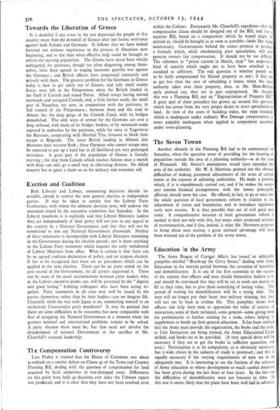Tte Compensation Controversy
Last Friday it seemed that the House of Commons was about to embark on a stormy debate on Clause 45 of the Town and Country Planning Bill, dealing with the question of compensation for land acquired by local authorities in war-damaged areas. Differences on this point have held up decisions ever since the Uthwatt report was produced, and it is clear that they have not been resolved even
within the Cabinet. Fortunately Mr. Churchill's expedient—that the compensation clause should be dropped out of the. Bill, and that a separate Bill, based on a compromise which he hoped might be arrived at, should be brought in as soon as possible—looks like being unnecessary. Conversations behind the scenes promise to produce a formula which, while checkmating pure speculation, will give genuine owners fair compensation. It should not be too difficult The reference to " prices current in March, 1939 " has acquired a kind of sanctity which ought not to have been attached to a standard so arbitrary. The real question is 'whether people are to be fairly compensated for blitzed property or not ; if they are to get less than the cost of rebuilding a house when the local authority takes over their property, then, as Mr. Hore-Belisha aptly pointed out, they are in part expropriated. He thought this was a Planning Bill, not an " Expropriation- of Property Bill," A great deal of sheer prejudice has grown. up around this question which has arisen from the very proper desire to avert speculation in land. In view of the costs . of building today, the 1939 standard, which is inadequate -under ordinary War Damage compensation, is more palpably inadequate when applied to compulsory purchase under town-planning.


























 Previous page
Previous page